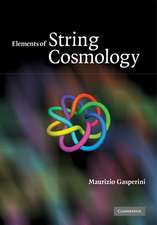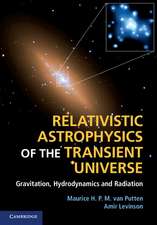From the Realm of the Nebulae to Populations of Galaxies: Dialogues on a Century of Research: Astrophysics and Space Science Library, cartea 435
Editat de Mauro D'Onofrio, Roberto Rampazzo, Simone Zaggiaen Limba Engleză Hardback – 9 aug 2016
Since the pioneering years of galaxy research in the early 20th century, the research on galaxies has seen a relentless advance directly connected to the parallel exponential growth of new technologies.
Through a series of interviews with distinguished astronomers the editors provide a snapshot of the achievements obtained in understanding galaxies. While many initial questions about their nature have been addressed, many are still open and require new efforts to achieve a solution. The discussions may reveal paradigms worthwhile revisiting. With the help of some of those scientists who have contributed to it, the editors sketch the history of this scientific journey and ask them for inspirations for future directions of galaxy research.
| Toate formatele și edițiile | Preț | Express |
|---|---|---|
| Paperback (1) | 1241.25 lei 6-8 săpt. | |
| Springer International Publishing – 22 apr 2018 | 1241.25 lei 6-8 săpt. | |
| Hardback (1) | 1247.70 lei 6-8 săpt. | |
| Springer International Publishing – 9 aug 2016 | 1247.70 lei 6-8 săpt. |
Din seria Astrophysics and Space Science Library
- 24%
 Preț: 799.10 lei
Preț: 799.10 lei - 15%
 Preț: 647.92 lei
Preț: 647.92 lei - 18%
 Preț: 983.81 lei
Preț: 983.81 lei - 18%
 Preț: 790.28 lei
Preț: 790.28 lei -
 Preț: 359.86 lei
Preț: 359.86 lei -
 Preț: 389.71 lei
Preț: 389.71 lei - 20%
 Preț: 691.14 lei
Preț: 691.14 lei - 20%
 Preț: 816.18 lei
Preț: 816.18 lei - 18%
 Preț: 1011.27 lei
Preț: 1011.27 lei -
 Preț: 402.56 lei
Preț: 402.56 lei - 15%
 Preț: 664.93 lei
Preț: 664.93 lei -
 Preț: 398.15 lei
Preț: 398.15 lei - 18%
 Preț: 954.77 lei
Preț: 954.77 lei -
 Preț: 411.04 lei
Preț: 411.04 lei - 18%
 Preț: 1225.31 lei
Preț: 1225.31 lei - 18%
 Preț: 1843.29 lei
Preț: 1843.29 lei -
 Preț: 393.13 lei
Preț: 393.13 lei -
 Preț: 400.26 lei
Preț: 400.26 lei - 18%
 Preț: 953.82 lei
Preț: 953.82 lei - 18%
 Preț: 960.61 lei
Preț: 960.61 lei -
 Preț: 398.35 lei
Preț: 398.35 lei -
 Preț: 390.84 lei
Preț: 390.84 lei -
 Preț: 413.76 lei
Preț: 413.76 lei -
 Preț: 416.64 lei
Preț: 416.64 lei - 18%
 Preț: 947.67 lei
Preț: 947.67 lei -
 Preț: 404.51 lei
Preț: 404.51 lei - 18%
 Preț: 956.50 lei
Preț: 956.50 lei -
 Preț: 403.75 lei
Preț: 403.75 lei - 18%
 Preț: 1229.40 lei
Preț: 1229.40 lei - 18%
 Preț: 1224.99 lei
Preț: 1224.99 lei -
 Preț: 404.29 lei
Preț: 404.29 lei - 15%
 Preț: 654.77 lei
Preț: 654.77 lei - 18%
 Preț: 1248.20 lei
Preț: 1248.20 lei - 18%
 Preț: 955.25 lei
Preț: 955.25 lei - 18%
 Preț: 1846.28 lei
Preț: 1846.28 lei - 18%
 Preț: 1233.06 lei
Preț: 1233.06 lei - 18%
 Preț: 1234.77 lei
Preț: 1234.77 lei
Preț: 1247.70 lei
Preț vechi: 1521.59 lei
-18% Nou
Puncte Express: 1872
Preț estimativ în valută:
238.77€ • 259.28$ • 200.57£
238.77€ • 259.28$ • 200.57£
Carte tipărită la comandă
Livrare economică 22 aprilie-06 mai
Preluare comenzi: 021 569.72.76
Specificații
ISBN-13: 9783319310046
ISBN-10: 3319310046
Pagini: 780
Ilustrații: XXIX, 785 p. 122 illus., 69 illus. in color.
Dimensiuni: 155 x 235 x 43 mm
Greutate: 1.31 kg
Ediția:1st ed. 2016
Editura: Springer International Publishing
Colecția Springer
Seria Astrophysics and Space Science Library
Locul publicării:Cham, Switzerland
ISBN-10: 3319310046
Pagini: 780
Ilustrații: XXIX, 785 p. 122 illus., 69 illus. in color.
Dimensiuni: 155 x 235 x 43 mm
Greutate: 1.31 kg
Ediția:1st ed. 2016
Editura: Springer International Publishing
Colecția Springer
Seria Astrophysics and Space Science Library
Locul publicării:Cham, Switzerland
Cuprins
The Milky Way and the Local Group.- The manifold observations of galaxies.- The new boundary of the galaxy concept.- How do galaxies form and evolve?.- I did it my way!.- What lacks? Challenges in galaxy investigation.- Concluding remarks by the Editors.
Recenzii
Selected by Choice magazine as an Outstanding Academic Title for 2017
“This is a remarkably detailed, 800-page compendium of information currently known about galaxies, told in an unusual question and answer interview format by dozens of experts in the field. … This 800-page book is well referenced and makes excellent use of diagrams and images, many of which appear in color. It is an essential reference for any individual with a technical interest in galaxies. Summing Up: Essential. Upper-division undergraduates and above; faculty and professionals.” (T. D. Oswalt, Choice, Vol. 54 (8), April, 2017)
“The book is well produced, with black-and-white and colour figures within the text. Each chapter has contributions from several authors, with references collected at the end of the chapter. … The book provides a good overview for those with some knowledge of the field.” (Phillip Helbig, The Observatory, Vol. 137, August, 2017)
“This is a remarkably detailed, 800-page compendium of information currently known about galaxies, told in an unusual question and answer interview format by dozens of experts in the field. … This 800-page book is well referenced and makes excellent use of diagrams and images, many of which appear in color. It is an essential reference for any individual with a technical interest in galaxies. Summing Up: Essential. Upper-division undergraduates and above; faculty and professionals.” (T. D. Oswalt, Choice, Vol. 54 (8), April, 2017)
“The book is well produced, with black-and-white and colour figures within the text. Each chapter has contributions from several authors, with references collected at the end of the chapter. … The book provides a good overview for those with some knowledge of the field.” (Phillip Helbig, The Observatory, Vol. 137, August, 2017)
Notă biografică
Mauro D'Onofrio is an associate professors at the Department of Physics and Astronomy G. Galilei, University of Padova. He is an expert in the calibration, and setup of astronomical instruments as well as of data reduction and data analysis. His research has focused on galaxies both without and with AGN. He has co-edited two previous volumes published by Springer(on Cosmology and Quasars) written in the same interview style as this book. dalfkädslfä
Roberto Rampazzo is a staff astronomer at INAF-Osservatorio Astronomico di Padova. His research focuses on interacting galaxies and early-type galaxies.
Simone Zaggia is a staff astronomer at INAF-Osservatorio Astronomico di Padova. He is specialised in the dynamics of stellar systems and the structure of the Milky Way.
Roberto Rampazzo is a staff astronomer at INAF-Osservatorio Astronomico di Padova. His research focuses on interacting galaxies and early-type galaxies.
Simone Zaggia is a staff astronomer at INAF-Osservatorio Astronomico di Padova. He is specialised in the dynamics of stellar systems and the structure of the Milky Way.
Textul de pe ultima copertă
In order to outline possible future directions in galaxy research, this book wants to be a short stopover, a moment of self-reflection of the past century of achievements in this area.
Since the pioneering years of galaxy research in the early 20th century, the research on galaxies has seen a relentless advance directly connected to the parallel exponential growth of new technologies.
Through a series of interviews with distinguished astronomers the editors provide a snapshot of the achievements obtained in understanding galaxies. While many initial questions about their nature have been addressed, many are still open and require new efforts to achieve a solution. The discussions may reveal paradigms worthwhile revisiting. With the help of some of those scientists who have contributed to it, the editors sketch the history of this scientific journey and ask them for inspirations for future directions of galaxy research.
Since the pioneering years of galaxy research in the early 20th century, the research on galaxies has seen a relentless advance directly connected to the parallel exponential growth of new technologies.
Through a series of interviews with distinguished astronomers the editors provide a snapshot of the achievements obtained in understanding galaxies. While many initial questions about their nature have been addressed, many are still open and require new efforts to achieve a solution. The discussions may reveal paradigms worthwhile revisiting. With the help of some of those scientists who have contributed to it, the editors sketch the history of this scientific journey and ask them for inspirations for future directions of galaxy research.
Caracteristici
In the stylistic tradition of Galileo's "Dialogue Concerning the Two Chief World Systems" Written as a series of interviews with many leading astronomers who participated in the history of extragalactic astronomy Documents the evolution of understanding of galaxies through the 20th and early 21st century Attractive also for undergraduate students who not only want to learn the state of the art of a field but seek an understanding of astronomical thinking and understanding














